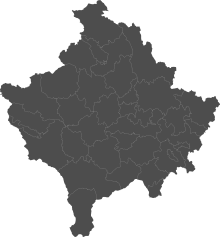Municipalities of Kosovo
A municipality (Albanian: komuna, Serbian: општина / opština) is the basic administrative division in Kosovo and constitutes the only level of power in local governance.[1] There are 38 municipalities in Kosovo; 27 of which have an Albanian ethnic majority, 10 Serb and 1 Turkish. After the 2013 Brussels Agreement, signed by the governments of Kosovo[a] and Serbia, an agreement was made to create a Community of Serb Municipalities, which would operate within Kosovo’s legal framework. Since 2013, the agreement has not been fulfilled by Kosovo's authorities, calling upon its constitution and ‘territorial integrity’. Serbia does not recognize Kosovo as a sovereign state, but as an autonomous region according to its constitution.[2]

38 Municipalities of Kosovo
| Emblem Stema Amblem |
Municipality Komuna Opština[3] |
Area km² (sq mi)[4] |
Map Location |
Settlements Vendbanimet Naselja[5] |
Population (2011)[6][7] |
Mayor Kryetar/e Gradonačelnik[8] |
|---|---|---|---|---|---|---|
| Deçan Dečani |
293.97 km2 (113.50 sq mi) | 37 | 40,019 | Bashkim Ramosaj (AAK) | ||
| Dragash Dragaš |
433.85 km2 (167.51 sq mi) | 36 | 33,997 | Shaban Shabani (PDK) | ||
| Ferizaj Uroševac |
344.61 km2 (133.05 sq mi) | 45 | 108,610 | Agim Aliu (PDK) | ||
| Kosovo Polje Fushë Kosova |
84.09 km2 (32.47 sq mi) | 16 | 34,827 | Burim Berisha (LDK) | ||
| Gjakova Đakovica |
586.62 km2 (226.50 sq mi) | 88 | 94,556 | Ardian Gjini (AAK) | ||
| Gjilan Gnjilane |
391.84 km2 (151.29 sq mi) | 49 | 90,178 | Lufti Haziri (LDK) | ||
| Glogovac Glogovac |
275.63 km2 (106.42 sq mi) | 35 | 58,531 | Ramiz Lladrovci (PDK) | ||
| Gračanica Graçanica |
122.41 km2 (47.26 sq mi) | 17 | 10,675 | Srđan Popović (LS) | ||
| Elez Han Elez Han |
83.11 km2 (32.09 sq mi) | 11 | 9,403 | Rufki Suma (I) | ||
| Istok Istog |
454.36 km2 (175.43 sq mi) | 50 | 39,289 | Haki Rugova (LDK) | ||
| Junik Junik |
77.78 km2 (30.03 sq mi) | 3 | 6,084 | Agron Kuçi (AAK) | ||
| Kaçanik Kačanik |
211.28 km2 (81.58 sq mi) | 31 | 33,409 | Besim Ilazi (PDK) | ||
| Kamenica Kamenica |
416.61 km2 (160.85 sq mi) | 58 | 36,085 | Qëndron Kastrati (PSD) | ||
| Klina Klina |
309.02 km2 (119.31 sq mi) | 54 | 38,496 | Zenun Elezaj (AAK) | ||
| Klokot Kllokot |
23.39 km2 (9.03 sq mi) | 4 | 2,556 | Božidar Dejanović (LS) | ||
| Leposavić Leposaviq |
539.05 km2 (208.13 sq mi) | 75 | 13,773 | Zoran Todić (LS) | ||
| Lipljan Lipjan |
338.41 km2 (130.66 sq mi) | 62 | 57,605 | Imri Ahmeti (LDK) | ||
| Mališevo Malisheva |
306.42 km2 (118.31 sq mi) | 44 | 54,613 | Ragip Begaj (Nisma) | ||
| Mamuša Mamusha |
10.94 km2 (4.22 sq mi) | 1 | 5,507 | Abdulhadi Krasniç (KDTP) | ||
| Mitrovica Kosovska Mitrovica |
329.35 km2 (127.16 sq mi) | 47 | 71,909 | Agim Bahtiri (AKR) | ||
| North Mitrovica Severna Kosovska Mitrovica |
6.83 km2 (2.64 sq mi) | 1 | 12,326 | Goran Rakić (LS) | ||
| Novo Brdo Novobërda |
203.98 km2 (78.76 sq mi) | 26 | 6,729 | Svetislav Ivanović (LS) | ||
| Obilić Obiliq |
104.84 km2 (40.48 sq mi) | 20 | 21,549 | Xhafer Gashi (AAK) | ||
| Parteš Partesh |
28.67 km2 (11.07 sq mi) | 3 | 1,787 | Dragan Petković (LS) | ||
| Peć Peja |
602.63 km2 (232.68 sq mi) | 79 | 96,450 | Gazmend Muhaxheri (LDK) | ||
| Podujevo Podujeva |
632.59 km2 (244.24 sq mi) | 77 | 88,499 | Nexhmi Rudari (Acting) (LDK) | ||
| Pristina Priština |
523.13 km2 (201.98 sq mi) | 43 | 198,897 | Shpend Ahmeti (PSD) | ||
| Prizren Prizren |
626.86 km2 (242.03 sq mi) | 76 | 177,781 | Mytaher Haskuka (VV) | ||
| Orahovac Rahovec |
275.90 km2 (106.53 sq mi) | 36 | 56,208 | Smajl Latifi (AAK) | ||
| Ranilug Ranillug |
77.62 km2 (29.97 sq mi) | 13 | 3,866 | Vladica Aritonović (LS) | ||
| Skënderaj Srbica |
374.37 km2 (144.55 sq mi) | 49 | 50,858 | Bekim Jashari (I) | ||
| Suva Reka Suhareka |
361.04 km2 (139.40 sq mi) | 41 | 59,722 | Bali Muharremaj (AAK) | ||
| Štrpce Shtërpca |
247.70 km2 (95.64 sq mi) | 16 | 6,949 | Bratislav Nikolić (LS) | ||
| Štimlje Shtime |
134.42 km2 (51.90 sq mi) | 23 | 27,324 | Naim Ismajli (PDK) | ||
| Vitina Vitia |
269.69 km2 (104.13 sq mi) | 39 | 46,987 | Sokol Haliti (LDK) | ||
| Vučitrn Vushtrri |
344.85 km2 (133.15 sq mi) | 67 | 69,870 | Xhafer Tahiri (LDK) | ||
| Zubin Potok Zubin Potok |
334.38 km2 (129.10 sq mi) | 61 | 6,616 | Stevan Vulović (LS) | ||
| Zvečan Zveçan |
123.01 km2 (47.49 sq mi) | 35 | 7,481 | Vučina Janković (LS) | ||
| — | 38 | 10,905.25 km2 (4,210.54 sq mi) | — | 1,468 | 1,780,021 | — |
Powers of municipalities
All municipalities have the following competences, as regulated by Law Nr. 03/L-040 of the Constitution of Kosovo:[9]
- Local economic development.
- Urban and rural planning.
- Land use and development.
- Implementation of building regulations and building control standards.
- Local environmental protection.
- Provision and maintenance of public services and utilities, including water supply, sewers and drains, sewage treatment, waste management, local roads, local transport and local heating schemes.
- Local emergency response.
- Provision of public pre-primary, primary and secondary education, including registration and licensing of educational institutions, recruitment, payment of salaries and training of education instructors and administrators.
- Provision of public primary health care.
- Provision of family and other social welfare services, such as care for the vulnerable, foster care, child care, elderly care, including registration and licensing of these care centers, recruitment, payment of salaries and training of social welfare professionals.
- Public housing.
- Public health.
- Licensing of local services and facilities, including those related to entertainment, cultural and leisure activities, food, lodging, markets, street vendors, local public transportation and taxis.
- Naming of roads, streets and other public places.
- Provision and maintenance of public parks and spaces.
- Tourism.
- Cultural and leisure activities.
- Any matter which is not explicitly excluded from their competence nor assigned to other authorities.
Community of Serb Municipalities

Municipalities with Serb majorities have additional powers over the appointment of local police commanders, religious and cultural heritage sites within their boundaries; some of them have competences over universities and secondary health which in non-Serb-majority municipalities are a matter for central government (and, through the right of association of municipalities, even those Serb-majority municipalities which are not specifically given these powers may exercise them in association with those that do).
The 2013 Brussels Agreement signed by the Government of Kosovo and the Government of Serbia contains provisions for the formation of a Community of Serb Municipalities [10] (Serbian: Заједница српских општина / Zajednica srpskih opština; Albanian: Asociacioni i komunave serbe) It was expected to be created in 2015, but its formation has been postponed over conflicts about extent of powers.
Former municipalities
Between 1990 and 2000, in the Autonomous Province of Kosovo and Metohija, there were the following additional municipalities:
In 2000 both were merged into the new municipality of Dragaš. The number of municipalities remained at 30 until 2005, when the new municipality of Mališevo was formed, by taking territories from the municipalities of Orahovac (District of Gjakova), Suva Reka (District of Prizren), Klina (District of Peć) and Glogovac (District of Pristina).
See also
Notes
| a. | ^ Kosovo is the subject of a territorial dispute between the Republic of Kosovo and the Republic of Serbia. The Republic of Kosovo unilaterally declared independence on 17 February 2008, but Serbia continues to claim it as part of its own sovereign territory. The two governments began to normalise relations in 2013, as part of the 2013 Brussels Agreement. Kosovo is currently recognized as an independent state by 97 out of the 193 United Nations member states. In total, 112 UN member states recognized Kosovo at some point, of which 15 later withdrew their recognition. |
| b. | ^ Due to the boycott by most municipalities in the north in the 2011 Kosovo census, the exact number of the population of Leposavić, North Mitrovica, Zubin Potok and Zvečan is unknown. Estimates are taken according to a 2014 OSCE report.[11][12][13][14] |
References
- Organizimi dhe Funksionimi i Vetëqeverisjes Lokale në Kosovë
- Brussels Agreement (2013)
- Komunat e Kosovës
- Raport Fotografik i Matjes së Territorit të Republikës së Kosovës
- Vendbanimet e Komunave të Kosovës
- Kosovo Population Census (2011)
- Albanian Minority Municipalities in Kosovo
- Rezultatet Përfundimtare të Zgjedhjeve Lokale 2017
- "LAW ON LOCAL SELF GOVERNMENT". Constitution of Kosovo.
- "Community of Serb Municipalities in Kosovo to be formed | InSerbia News". Inserbia.info. Retrieved 2015-10-30.
- "OSCE Leposavic estimates". OSCE.
- "OSCE Mitrovica North estimate". OSCE.
- "OSCE Zubin Potok estimate". OSCE.
- "OSCE Zvecan estimates". OSCE.
External links
| Wikimedia Commons has media related to Municipalities in Kosovo. |
